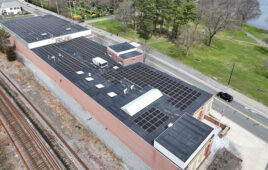Today, the Vermont Public Utility Commission issued its required update of the state’s net-metering program. As a result of the adjustments, most existing net-metering systems will see an increase in their compensation. Future systems that apply for permits on and after September 1, 2022, will see a small net decrease in compensation compared to existing systems.
Every two years, the commission is required to assess the incentives offered to new net-metering systems and decide whether they should be adjusted upward or downward. The purpose of this adjustment is to ensure that the pace of net-metering deployment is consistent with Vermont’s policy objectives, while considering the program’s impacts on electric rates. Considerations include the changing cost of installing net-metering systems, the pace of past net-metering deployment and the impact of net-metering on all ratepayers.
The net-metering program, which was established in 1999, is only one of several programs available for developing solar and other types of renewable energy in Vermont. Customers who participate in the net-metering program can offset their electric bills through financial incentives based on the amount of electricity generated by their net-metering systems.
The commission is required to reconsider the financial incentives offered to new net-metering systems every two years through its biennial review process to ensure that the program continues to provide value to all Vermonters, including those that do not directly participate in the net-metering program. Today’s order is a conclusion of that review process.
The information and data presented in this year’s biennial review proceeding show that the net-metering program — in particular, solar net-metering — continues to have robust participation despite several decreases in compensation since the program began. In 2021, more than 86% of net-metering CPGs (certificates of public good) were issued within 31 days, as many of the best-sited net-metering systems benefited from streamlined permitting. Nearly 3,000 new solar net- metering systems and one wind net-metering system received CPGs in 2021, for a total of approximately 45 MW of new renewable energy capacity. This surpasses the approximately 36 MW of net-metering permits issued in 2020 and continues to exceed the amount needed to meet Vermont’s current renewable energy requirements.
However, the data presented in this biennial proceeding also demonstrate that net metering is the costliest of the state’s renewable energy programs, and that the pace of net-metering installations far exceeds the pace of other less costly renewable energy projects. For example, 2021 saw the interconnection of more than 28 MW of net-metered projects, compared to 6.5 MW of standard-offer projects and 3.7 MW of utility-sourced solar power, even though the standard-offer and utility-sourced renewable projects were at a significantly lower price. This trend toward many more net-metered projects ultimately increases rates for Vermonters who do not or are unable to participate in the net-metering program.
Therefore, to better moderate the pace of new net-metering development, the commission determined to reduce the compensation offered to new net-metering systems – resulting in a net decrease of $0.00272 per kWh, or less than three-tenths of one cent. However, because of other adjustments made in today’s order, most existing net-metering systems will benefit from an increase of $0.00728 per kWh, or approximately three-quarters of one cent, in their current incentives.
“The commission is committed to aggressively pursuing and enforcing Vermont’s renewable energy requirements, but it is imperative that we remain focused on and routinely re-examine the cost of our renewable energy policies and programs and how they affect Vermonters,” said commission chair Anthony Roisman. “Net-metering will continue to be an important component of Vermont’s portfolio approach to addressing climate change, but it should not displace other, lower-cost sources of renewable generation.”
The adjustments announced through the biennial update will take effect on September 1, 2022.
News item from the State of Vermont PUC





Tell Us What You Think!